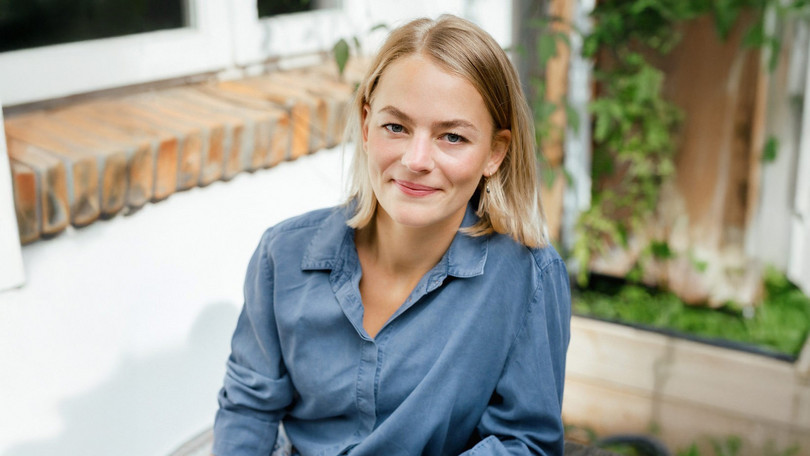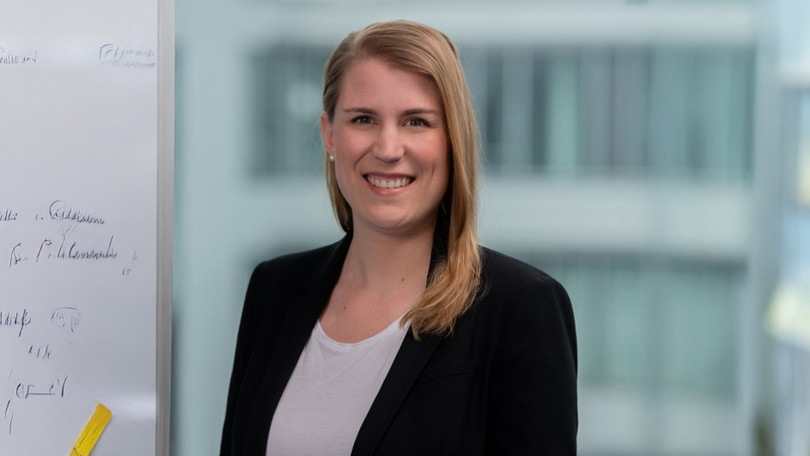Sustainability Reporting and Accounting: Experience reports
Sustainability Reporting and Accounting – what makes this certificate programme special, what content can be applied in the workplace, and why did others choose this continuing education programme? Current and former students share their experiences in our testimonials.
Expand expertise in a targeted manner
 ©Veronika Krebs
©Veronika Krebs
Gesche Thörl is a self-employed management consultant and successfully completed the Sustainability Accounting and Management Control (now: Sustainability Reporting and Accounting) certificate in 2023. She is also studying for an MBA in Sustainability Management at Leuphana University in Lüneburg and has taken modules from the Decarbonisation Management and Sustainable Supply Chain Management certificates as part of her specialisation.
Why did you decide to pursue a part-time certificate programme at Leuphana?
The certificate was the ideal complement for me to expand my expertise in a targeted manner. The current content and high thematic relevance to my professional practice convinced me. The programme allowed me to further sharpen my profile and position myself even more clearly in my field.
What is special about your certificate programme for you?
For me, the Sustainability Accounting and Management Control certificate stands out in several ways:
- The compact duration of six months allows for an in-depth examination of the topics, but at the same time remains easy to plan.
- In view of current and future regulations in the area of sustainability and reporting, the content taught is highly relevant.
- I found the practical insights provided by guest contributions from experts and the inspiring exchange with other participants particularly valuable – a network that will continue long after the programme has ended.
- An additional bonus is the opportunity to have the credits earned counted towards a degree.
Which aspects of the programme have been most beneficial to you professionally and/or personally so far?
The certificate helped me develop an even more holistic understanding of sustainability accounting as part of progressive and sound sustainability management. I found the third module, Methods of Sustainability Management Accounting, particularly valuable, as it focuses on positive sustainability performance management. This topic inspired me so much that I have continued to explore it in my work and research ever since.
During your studies, you can work on a personal transfer project – how did you find the transfer project?
At first, I wasn't entirely sure what to expect from the transfer project. But looking back, it was the central element of my learning experience. The opportunity to apply the theoretical content directly to a specific company – in my case, a company that was just completing its double materiality analysis – was extremely valuable. I was able to continuously check how the course content could be applied in practice and received qualified feedback from the lecturers. This transfer of theory into practice has greatly benefited both me and the company.
What advice would you give to anyone interested in studying part-time?
Network! In addition to the technical knowledge, the contacts and exchanges with other participants are one of the most enriching aspects. Mutual learning and support not only make the programme more valuable, but also help to make challenging phases easier to master.
New ideas and practical methods
 ©privat
©privat
Anja Kubeneck works as a sustainability consultant and manager at Ramboll Management Consulting and successfully completed the Sustainability Reporting and Accounting certificate programme at Leuphana University Lüneburg in the winter semester of 2024/2025.
Why did you decide to pursue a part-time certificate at Leuphana?
In recent years, I have worked as a sustainability consultant on many projects in the field of CSRD reporting, which has allowed me to gain valuable practical insights. I found the part-time certificate programme at Leuphana exciting in this context because it offered me an additional, well-founded academic perspective on the topic of reporting. It helped me to reflect on, classify and analyse my thoughts and observations from practice. The exchange of experiences with fellow students and their input were particularly valuable.
CSRD and ESRS have also brought aspects to the fore that were previously less noticed – for example: How do I measure sustainability aspects as meaningfully as possible? Which KPIs can I use and which ones do I need to develop from scratch? I was particularly drawn to the accounting focus of the certification programme. I was looking for new food for thought and practical methods, especially in areas such as biodiversity and human rights.
Which aspects of the programme have been most beneficial to you professionally and/or personally so far?
For me, no single aspect stands out. Rather, the multitude of ideas provided by lecturers, the relevant literature they pointed out and, above all, the questions and perspectives of the other participants are invaluable. This learning experience has given me many new ideas and inspiration. I also discovered valuable sources and deepened my methodological understanding of certain frameworks, which I can draw on in my daily work.
During your studies, you can work on a personal transfer project – how did you find the transfer project?
The transfer project was a really enriching experience for me. I particularly liked the variety of tasks – from essays to presentations to posters. The formats offered variety and stimulated creativity. The project – in my case a fictional case study – helped me to apply the knowledge I had learned in a practical way.
It gave me the freedom to deal with a sustainability topic or framework in particular depth, to set priorities and thus to pursue my interests. In my case, for example, it gave me the opportunity to delve deeper into the Natural Capital Protocol and apply some of its approaches to my project. Without the transfer project, I would certainly not have consolidated my knowledge to the same extent and would not have engaged so intensively with the course content, concepts, frameworks and publications.
Contact & Advising
Advising
Elfi Lindenau, M.Sc.
Universitätsallee 1, C11.413
21335 Lüneburg
Fon +49.4131.677-2941
elfi.lindenau@leuphana.de
Coordination
Benjamin Sachs, M.Sc.
Universitätsallee 1, C11.412
21335 Lüneburg
Fon +49.4131.677-2234
benjamin.sachs@leuphana.de
E-Mail Contact
Please feel free to contact us via samc@leuphana.de.
